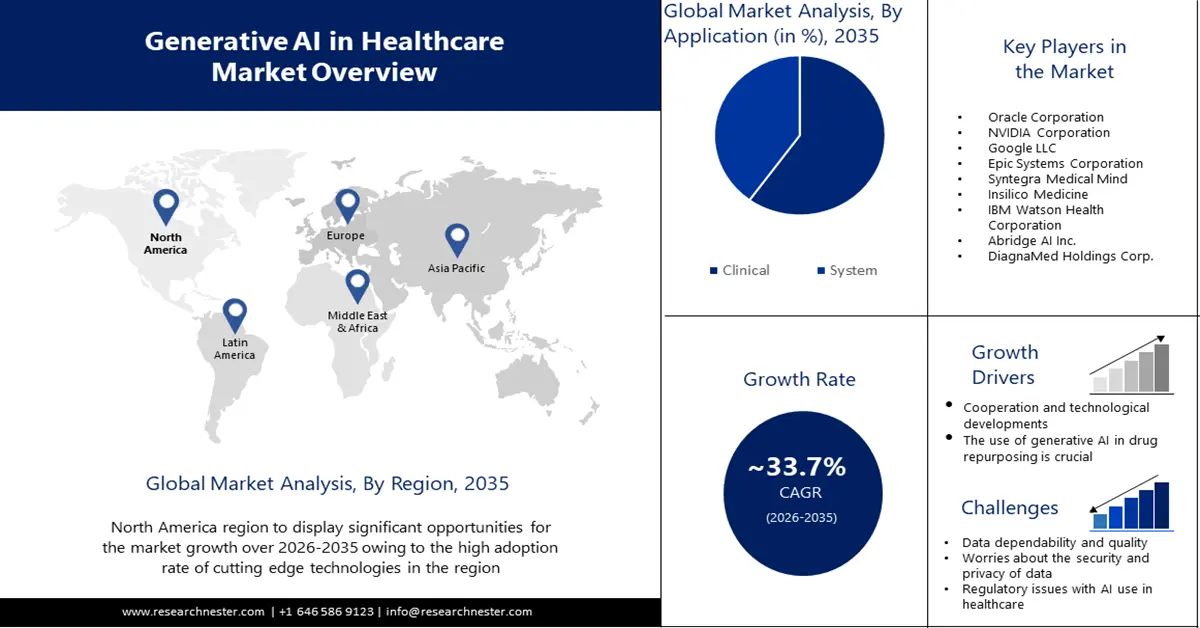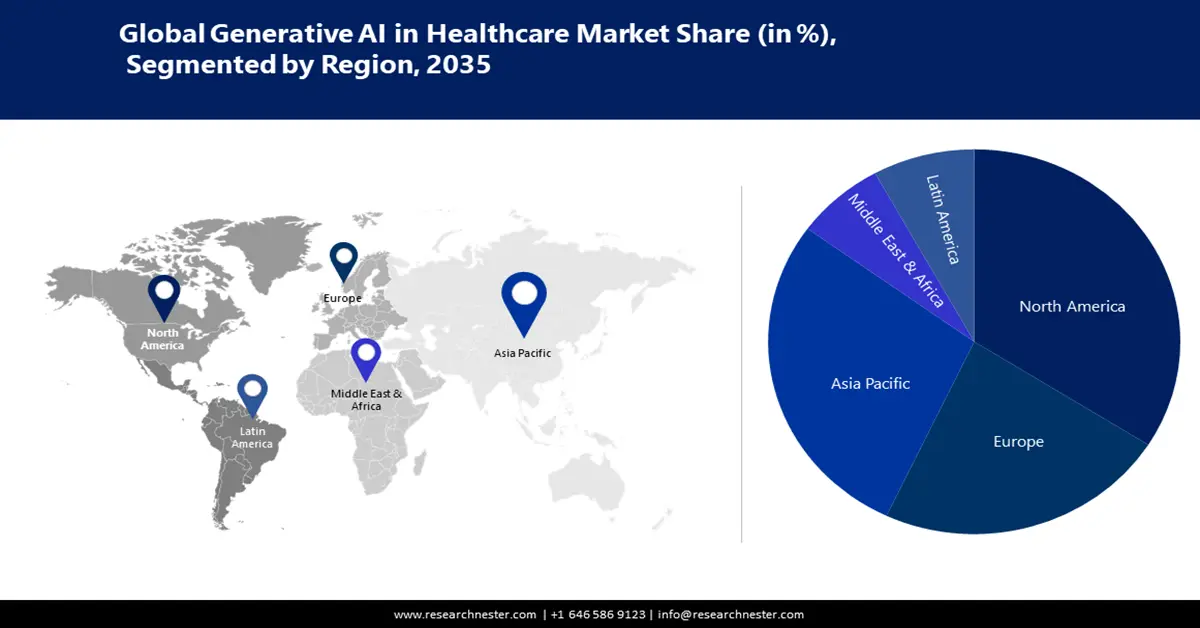Generative AI in Healthcare Market Outlook:
Generative AI in Healthcare Market size was valued at USD 2.79 billion in 2025 and is set to exceed USD 50.92 billion by 2035, expanding at over 33.7% CAGR during the forecast period i.e., between 2026-2035. In the year 2026, the industry size of generative AI in healthcare is estimated at USD 3.64 billion.

The ability of generative AI to produce inventive and dependable data has drawn attention from the market. This has improved patient reactions, allowed for better diagnosis, and produced synthetic datasets for training and testing. According to the Survey, roughly 75% of significant healthcare organizations are presently experimenting with or planning to scale generative AI. This indicates that the healthcare sector is heavily investing in exposing the transformative possibilities of generative AI.
In addition to these, the market will expand considerably as a result of the application of generative AI in medication research and development. The process of finding new drugs is greatly accelerated by generative AI technology, which creates novel compounds and predicts their possible biological actions using deep learning algorithms. Generative artificial intelligence (AI) shortens the time and expense often involved in the discovery of new medications by modeling and forecasting the interactions between chemicals and biological targets. Additionally, it has made it possible for scientists to investigate large, previously unreachable chemical regions, which has resulted in the discovery of intriguing treatment possibilities for conditions ranging from cancer to uncommon genetic abnormalities.
Key Generative AI in Healthcare Market Insights Summary:
Regional Highlights:
- North America generative AI in healthcare market will account for 30% share by 2035, driven by the strong technology landscape, robust healthcare infrastructure, and substantial R&D backing in the region.
- Asia Pacific market will account for 28% share by 2035, driven by rapid digital transformation, a developing tech ecosystem, and rising demand for precision medicine.
Segment Insights:
- The clinical segment in the generative ai in healthcare market is poised for substantial growth, achieving a 60% share by 2035, driven by generative AI’s role in diagnosis and treatment planning.
- The solution segment in the market is expected to achieve a 58% share by 2035, driven by cost-effectiveness and integration into healthcare systems.
Key Growth Trends:
- The benefits of AI in terms of the economy
- Cooperation and technological developments
Major Challenges:
- The benefits of AI in terms of the economy
- Cooperation and technological developments
Key Players: Oracle Corporation, NVIDIA Corporation, Google LLC, Epic Systems Corporation, Syntegra Medical Mind, Insilico Medicine, IBM Watson Health Corporation, Abridge AI Inc., DiagnaMed Holdings Corp.
Global Generative AI in Healthcare Market Forecast and Regional Outlook:
Market Size & Growth Projections:
- 2025 Market Size: USD 2.79 billion
- 2026 Market Size: USD 3.64 billion
- Projected Market Size: USD 50.92 billion by 2035
- Growth Forecasts: 33.7% CAGR (2026-2035)
Key Regional Dynamics:
- Largest Region: North America (30% Share by 2035)
- Fastest Growing Region: Asia Pacific
- Dominating Countries: United States, China, Germany, United Kingdom, Japan
- Emerging Countries: China, India, Japan, South Korea, Singapore
Last updated on : 14 October, 2025
Generative AI in Healthcare Market Growth Drivers and Challenges:
Growth Drivers
- The benefits of AI in terms of the economy - The application of AI in healthcare has a significant financial impact in terms of both revenue generation and cost reduction. AI-powered chatbots, for example, might offer patients and members quick, tailored assistance, reducing costly ER visits and enhancing access to preventative care. Predictive analytics helps medical practitioners take preventative measures and avoid later, more costly treatments by identifying individuals who are likely to develop chronic diseases. This year, more than half of healthcare organizations are getting ready to launch pilot programs to test out ChatGPT, an AI chatbot, for educational purposes. AI may also aid in population health management by enabling healthcare organizations to tailor their offerings to the needs of specific patients and member groups by identifying patterns and trends in enormous databases. AI in healthcare has the potential to improve patient care, save costs, and increase revenue overall.
- Cooperation and technological developments - The generative AI in healthcare market is being pushed by partnerships between research organizations, healthcare facilities, and technology companies. These partnerships encourage the sharing of information, resources, and skills, expanding the potential uses of generative AI in healthcare. Furthermore, the development and sophistication of generative AI solutions are facilitated by improvements in computer capacity, data accessibility, and AI technology. AI in healthcare could result in savings of 5% to 10%. According to AI in healthcare data, 90% of nursing jobs will still be carried out by people in 2030.
- The use of generative AI in drug repurposing is crucial - In drug repurposing, which involves re-evaluating already-approved medications for novel therapeutic indications by examining their molecular interactions, generative AI is essential. This method optimizes the use of already available pharmacological substances while also hastening the identification of possible remedies. Furthermore, generative AI is a priceless tool for improving clinical trial designs and forecasting patient reactions to different therapies, which boosts the effectiveness and success rates of medication development initiatives. By helping to identify patient subpopulations that are most likely to benefit from a specific medication, it helps to personalize treatment and lower the chance of unfavourable outcomes.
Challenges
- Data dependability and quality - For training, generative AI models strongly depend on representative, varied, and high-quality datasets. Acquiring such information in the healthcare industry can be difficult because of problems including bias, fragmented data, and non-standard data formats. Applications' efficacy and security may be jeopardized by generative AI outputs that are imprecise or untrustworthy due to faulty or biased training data.
- Worries about the security and privacy of data.
- Regulatory issues with AI use in healthcare.
Generative AI in Healthcare Market Size and Forecast:
| Report Attribute | Details |
|---|---|
|
Base Year |
2025 |
|
Forecast Period |
2026-2035 |
|
CAGR |
33.7% |
|
Base Year Market Size (2025) |
USD 2.79 billion |
|
Forecast Year Market Size (2035) |
USD 50.92 billion |
|
Regional Scope |
|
Generative AI in Healthcare Market Segmentation:
Application Segment Analysis
The clinical segment is projected to hold the largest market share of about 60% by 2035. Because generative AI is being integrated into specialist fields like cancer, infectious disease, dermatology, and cardiovascular care, this market segment has become a dominant force in the healthcare industry. Advanced cardiac data analysis is one way that generative AI is being used in cardiovascular health to support accurate diagnosis and individualized therapy planning. By examining skin issues, dermatology can provide more precise diagnosis and therapy recommendations. Generative AI aids in the identification of pathogens and facilitates quick reactions to outbreaks of infectious diseases. It is essential for genetic analysis and tailored treatment recommendations in oncology, demonstrating the substantial influence of generative AI in improving clinical decision-making. Globally, cardiovascular diseases (CVDs) account for 17.9 million deaths annually, making them the leading cause of death.
Component Segment Analysis
Based on the component, the solution segment in the generative AI in healthcare market is predicted to dominate 58% share during the forecast period. Code generation uses machine learning models to generate code automatically. A rapidly developing field, generative AI has several potential uses in the medical field, such as drug development, predictive modeling, and improved medical imaging. A given solution segment's prospective domination would probably result from its shown efficacy, affordability, regulatory compliance, and smooth integration into the current healthcare infrastructures. Better diagnostic results, faster drug development, and more accurate patient care are some of the factors that could lead to a particular generative AI system dominating the healthcare sector.
Our in-depth analysis of the global market includes the following segments:
|
Component |
|
|
Application |
|
|
Function |
|
|
End-Use |
|

Vishnu Nair
Head - Global Business DevelopmentCustomize this report to your requirements — connect with our consultant for personalized insights and options.
Generative AI in Healthcare Market Regional Analysis:
North American Market Insights
Generative AI in healthcare market in the North American region is anticipated to account for revenue share of 30% during the forecast timeline. This region is favourable to adopting and implementing cutting-edge AI technologies since it has a strong technology landscape and a well-established healthcare infrastructure. Furthermore, substantial R&D expenditures along with robust backing from public and private sectors have expedited the expansion of generative AI applications in the healthcare domain. In addition, the area is home to a large number of top AI-focused research institutes and tech firms, which promotes creativity and teamwork. Thus, there is a growing interest in generative AI, which is driving its growth and popularity in the North American healthcare arena, as a result of the pressing need for breakthroughs in precision medicine, patient outcomes, and healthcare efficiency.
APAC Market Insights
Generative AI in healthcare market in the Asia Pacific region is projected to hold 28% share by 2035. Rapid digital transformation and a developing tech ecosystem in nations like China, India, Japan, and Singapore are opening the door for the easy adoption and integration of cutting-edge AI technology in the healthcare industry. Because of this changing environment and the region's large and diverse population, precision medicine is becoming more and more important, which is driving demand for customized healthcare solutions.

Generative AI in Healthcare Market Players:
- Microsoft Corporation
- Company Overview
- Business Strategy
- Key Product Offerings
- Financial Performance
- Key Performance Indicators
- Risk Analysis
- Recent Development
- Regional Presence
- SWOT Analysis
- Oracle Corporation
- NVIDIA Corporation
- Google LLC
- Epic Systems Corporation
- Syntegra Medical Mind
- Insilico Medicine
- IBM Watson Health Corporation
- Abridge AI Inc.
- DiagnaMed Holdings Corp.
Recent Developments
- September 2023: Oracle unveiled a redesigned generative AI solution for medical institutions. By integrating voice commands with Oracle's EHR systems, the Oracle Clinical Digital Assistant helps providers focus more on patient care by streamlining chores. To sustain its place in the cutthroat AI market, Oracle is anticipated to expand its capabilities and efficiency with the release of this new solution.
- May 2023: A generative AI data analysis tool called FormGPT.io was introduced by Canadian biotechnology company DiagnaMed Holdings Corp. specifically for the healthcare industry. With this launch, the business is taking a step toward releasing its first commercial product. Its goal is to produce a suite of configurable applications that make use of GPT-4's capability. The purpose of these applications is to enhance patient outcomes and optimize workflow in actual healthcare environments. The purpose of these applications is to enhance patient outcomes and optimize workflow in actual healthcare environments.
- Report ID: 5728
- Published Date: Oct 14, 2025
- Report Format: PDF, PPT
- Explore a preview of key market trends and insights
- Review sample data tables and segment breakdowns
- Experience the quality of our visual data representations
- Evaluate our report structure and research methodology
- Get a glimpse of competitive landscape analysis
- Understand how regional forecasts are presented
- Assess the depth of company profiling and benchmarking
- Preview how actionable insights can support your strategy
Explore real data and analysis
Frequently Asked Questions (FAQ)
Generative AI in Healthcare Market Report Scope
Free Sample includes current and historical market size, growth trends, regional charts & tables, company profiles, segment-wise forecasts, and more.
Connect with our Expert
Copyright @ 2026 Research Nester. All Rights Reserved.




